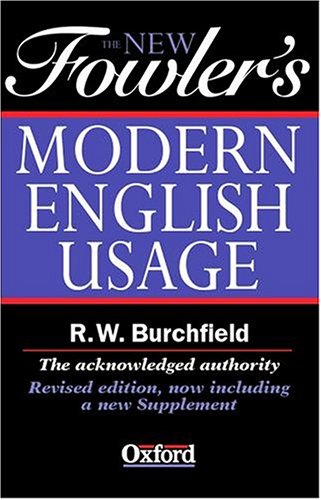So there is a new Fowler, or rather a Burchfield. It joins the list of beloved reference works corrupted or destroyed to placate our ignorance and our political sensibilities. Brewer’s Dictionary of Phrase and Fable had many of its supposedly dated items excised to make room for television trivia. The Encyclopedia Britannica traded the wit and style of previous editions for turgid scientism. Now it is the turn of H.W. Fowler’s Modern English Usage to go under the knife.
When Fowler was first revised by Sir Ernest Gowers in 1965, the body of work was left mostly untouched. Sir Ernest merely added the more obvious new usages and some amusing articles of his own—”abstractitis,” “headline language.” However, this new edition, apart from the robbery of his name, has nothing to do with Fowler, and its appearance indicates the extent to which the English language has been assaulted and polluted by the political commissar.
In 1965, Sir Ernest wrote a tribute to his predecessor in which he described Fowler’s experience in the Great War and called his book incomparable; Dr. Burchfield, in his preface, chooses to insult Fowler. Fowler wrote in “isolation.” His work is “vulnerable.” “It is not, of course, as antiquated as Aelfrie’s grammar, nor yet as those of Ben Jonson and Robert Lowth. But it is a fossil all the same.” (Burchfield also misspells the name of the school where Fowler taught—perhaps there is a “Sedburgh” in Burchfield’s New Zealand; in Yorkshire there is Sedbergh).
By enlisting as a neutral in the great cultural war of our time. Dr. Burchfield has neglected his duty. There are scores of politically correct style handbooks on the market: Fowler is supposed to be the opposite, prescriptive rather than descriptive, cantankerous, suspicious of the new, and offensive to those whom Thomas Sowell calls the “anointed.” In taking a Laodicean position. Dr. Burchfield has given aid and comfort to the enemy, and destroyed the spirit of the work he was supposed to be revising.
He says that he is not a pessimist: “I am sure that the English language is not collapsing—more severe changes have come about in the past centuries than any that have occurred in the twentieth century.” This is disingenuous; previous linguistic changes, however “severe,” occurred naturally and were not coerced. Changes were made on aesthetic, not political grounds. There were no grand schemes to purify the language. Today, our morality resides not in religion but in politics, and our politics have become our religion; the English language lies besieged by those for whom sin is denoted by class (upper), attitude (conservative), skin color (white), sex (male), faith (Christian), and sexual orientation (heterosexual). Singly, or in combination, these are the evils that are to be expunged from Modern English Usage.
The commonest words and usages are under attack. Fanatical editresses (as Fowler would have called them) search for the neutral “he” and “him” to change to “she” and “her.” Hardened copy editors swoon at the sight of “Negro” or “housewife” or “chink” (I know someone who was brought up on charges at a university for writing the phrase “a chink in his armour”). “Gay” is gone, and “queer” is fast being lost. Even “black,” as in “a black mood,” “black with rage,” “night’s black agents,” has been deemed offensive. We need Fowler—the real Fowler—more than ever.
[The New Fowler’s Modern English Usage, Third Edition, Edited by R.W. Burchfield (New York: Oxford University Press) 864 pp., $25.00]

Leave a Reply